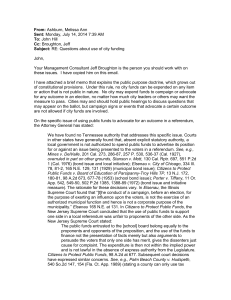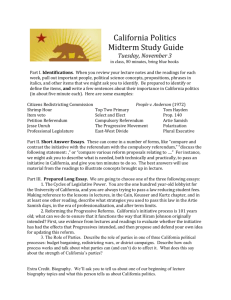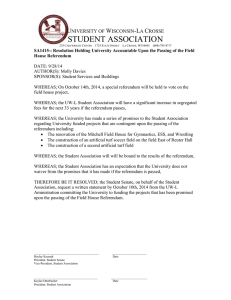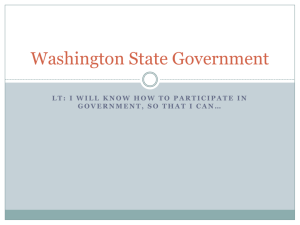Sent: The Mayor would like to know if the City can... create a municipal school district. He believes that we can...
advertisement
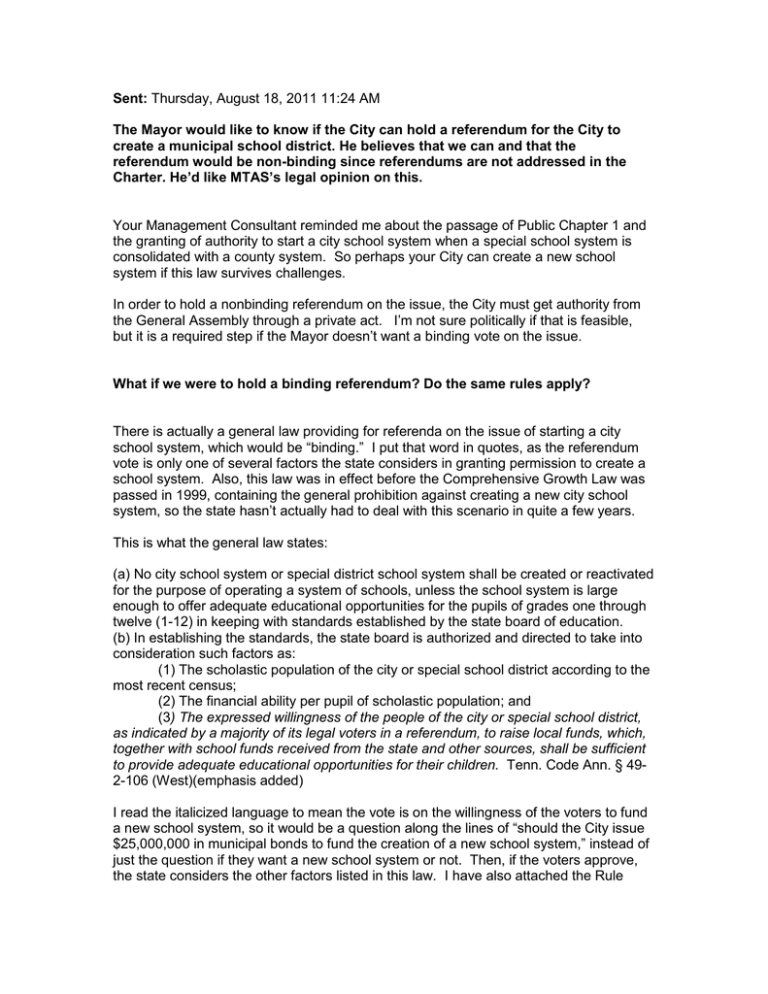
Sent: Thursday, August 18, 2011 11:24 AM The Mayor would like to know if the City can hold a referendum for the City to create a municipal school district. He believes that we can and that the referendum would be non-binding since referendums are not addressed in the Charter. He’d like MTAS’s legal opinion on this. Your Management Consultant reminded me about the passage of Public Chapter 1 and the granting of authority to start a city school system when a special school system is consolidated with a county system. So perhaps your City can create a new school system if this law survives challenges. In order to hold a nonbinding referendum on the issue, the City must get authority from the General Assembly through a private act. I’m not sure politically if that is feasible, but it is a required step if the Mayor doesn’t want a binding vote on the issue. What if we were to hold a binding referendum? Do the same rules apply? There is actually a general law providing for referenda on the issue of starting a city school system, which would be “binding.” I put that word in quotes, as the referendum vote is only one of several factors the state considers in granting permission to create a school system. Also, this law was in effect before the Comprehensive Growth Law was passed in 1999, containing the general prohibition against creating a new city school system, so the state hasn’t actually had to deal with this scenario in quite a few years. This is what the general law states: (a) No city school system or special district school system shall be created or reactivated for the purpose of operating a system of schools, unless the school system is large enough to offer adequate educational opportunities for the pupils of grades one through twelve (1-12) in keeping with standards established by the state board of education. (b) In establishing the standards, the state board is authorized and directed to take into consideration such factors as: (1) The scholastic population of the city or special school district according to the most recent census; (2) The financial ability per pupil of scholastic population; and (3) The expressed willingness of the people of the city or special school district, as indicated by a majority of its legal voters in a referendum, to raise local funds, which, together with school funds received from the state and other sources, shall be sufficient to provide adequate educational opportunities for their children. Tenn. Code Ann. § 492-106 (West)(emphasis added) I read the italicized language to mean the vote is on the willingness of the voters to fund a new school system, so it would be a question along the lines of “should the City issue $25,000,000 in municipal bonds to fund the creation of a new school system,” instead of just the question if they want a new school system or not. Then, if the voters approve, the state considers the other factors listed in this law. I have also attached the Rule applied by the state’s Dept. of Education in making these decisions, so you have an idea how the vote results will be weighed and what else is required. So there is general law authority to have a referendum on the funding of a new city school system, without having to get private act authority. But if the voters approve of the measure, the City will have to move forward with an application. Since the binding referendum is only one of several factors the State Board would consider, is it mandatory for the creation of a city school system? And are referendums necessary for both an elected school board-run school system and a Board of Mayor and Aldermen run school system? Yes, it is mandatory to hold the referendum. Our general law, the Education Improvement Act, requires that the school board be elected as a separate body. Tennessee Code Annotated § 49-2-201(a)(1) states “Notwithstanding any other law to the contrary, there shall be a board of education elected by the people.” (Emphasis added). By using the phrase “notwithstanding any law to the contrary,” this general law is making no exceptions for private acts or home rule charters which provide a different method of selecting school board members, so a private act may not remove this requirement. The next question which may arise is whether or not a member of the Board of Mayor and Aldermen may also be a member of the Board of Education. The general law provides that the answer is “no,” in Tennessee Code Annotated § 49-2-202(a)(2). This section of the law states “No member of the county legislative body nor any other county official shall be eligible for election as a member of the county board of education.” At first glance, this language only applies to county boards of education. However, Tennessee Attorney General Opinion No. 96-123 states: “The Education Improvement Act of 1991 (EIA) provided for a uniform system of governance of county, municipal and special school districts. Part 2 of Chapter 2 of Title 49 now applies to “Boards of Education” rather than “County Boards of Education” as before....” (Emphasis added) The Attorney General is therefore of the opinion that the law applies equally to municipal and county boards of education, despite the failure of the General Assembly to substitute more inclusive language in T.C.A. § 49-2202. There are numerous Attorney General Opinions applying the Education Improvement Act to city school boards. See for example, Tenn. Atty. Gen. Op. Nos. 9315, 94-074, and 98-235. There are no reported court opinions or legislative acts which challenge this interpretation and application of the law by the Attorney General, so it stands as precedence on the issue. That being the case, the conclusion which logically follows is that the City must have an elected school board, and that the Board of Mayor and Aldermen may not legally serve as the school board, under the provisions of this law. Nor may a member of the Board be elected to a school board seat. Does this answer your questions? Let me know if you need more information. Melissa A. Ashburn Legal Consultant University of Tennessee Institute for Public Service Municipal Technical Advisory Service (865)974-0411
